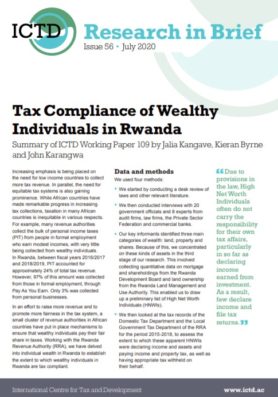Research in Brief 56
Increasing emphasis is being placed on the need for low income countries to collect more tax revenue. In parallel, the need for equitable tax systems is also gaining prominence. While African countries have made remarkable progress in increasing tax collections, taxation in many African countries is inequitable in various respects. For example, many revenue authorities collect the bulk of personal income taxes (PIT) from people in formal employment who earn modest incomes, with very little being collected from wealthy individuals. In Rwanda, between fiscal years 2016/2017 and 2018/2019, PIT accounted for approximately 24% of total tax revenue. However, 97% of this amount was collected from those in formal employment, through Pay As You Earn. Only 3% was collected from personal businesses. In an effort to raise more revenue and to promote more fairness in the tax system, a small cluster of revenue authorities in African countries have put in place mechanisms to ensure that wealthy individuals pay their fair share in taxes. Working with the Rwanda Revenue Authority (RRA), we have delved into individual wealth in Rwanda to establish the extent to which wealthy individuals in Rwanda are tax compliant. Summary of ICTD Working Paper 109 by Jalia Kangave, Kieran Byrne and John Karangwa.
